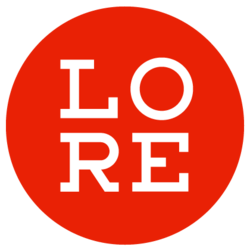Lore (company)
 | |
| Type of business | Educational social network |
|---|---|
| Headquarters | New York, New York |
| Key people | Joseph Cohen, Dan Getelman, Jim Grandpre, Hunter Horsley |
| Industry | Internet, Education |
| Employees | 12 |
| Website | lore.com |
| Alexa rank |
|
| Launched | November 2011 |
Lore was an online learning tool that incorporated social networking features.[2] It closed down on July 27, 2016. It was originally launched as Coursekit in November 2011. The company aims to be a platform where learners and instructors can continuously share educational content in a simple and social online environment.[3][4]
The company was originally known as Coursekit, but changed its name to Lore in April 2012. The company rebranded in order to encompass adoption of the site by groups who learn and teach outside the traditional “course”.[5] As of April 2012, the Lore network includes thousands of courses at over 600 colleges and universities, as well as classes created by student groups, bible study groups, and other organizations. Lore also employs over 100 college students to help encourage adoption of the site on their campuses.[5] In March 2013 Lore announced it had been acquired by Noodle Education.[6]
Lore offers its learning platform for free, marketing it directly to professors.[7] Lore’s main competitor is Blackboard, an online platform for courses that has dominated the Learning Management Systems market since the late 1990s.[7]
As of June 27th, 2016, Lore is no longer in operation.
Platform
The Lore platform allows teachers to create a website for their course. Its software then gives instructors the ability to start and facilitate student discussions, collect assignments, and share class materials. It also allows students to collaborate online, ask and answer each other's questions, share relevant content, and chat with one another.[2] In addition, Lore enables its instructors to make their course(s) freely available to the general public through their website.[8][9] Of particular note, the gradebook function has been removed in the current version of the platform. In the near future, Lore plans to develop a platform that incorporates learning communities outside of the classroom, specifically those found within universities.[8]
History
Founded by three University of Pennsylvania students, Lore originally began as a summer project for Wharton freshman Joseph Cohen and Wharton and Engineering sophomore Dan Getelman. Having developed the earliest version of Lore in June 2010, Getelman and Cohen recruited Jim Grandpre, an Engineering sophomore at University of Pennsylvania, in December 2010 to help them further develop their platform.[10]
In May 2011 the trio left the University of Pennsylvania to concentrate on the company full-time.[10]
The product was beta tested in the fall of 2011 with over 80 courses at 30 universities nationwide.[11] It was launched to the public on November 29, 2011.[11]
Funding
In June 2011 Lore raised $1 million in funding in a seed round.[12] Investors included Founder Collective, IA Ventures, Shasta Ventures, Techstars NYC, and angel investors like Ralph Mack, Zach Weinberg, Nat Turner, and David Tisch.[5][12]
On January 1, 2012 Lore announced that it had raised an additional $5 million in a second round of venture funding. Investors included Social+Capital, David Tisch, Joel Spolsky, and IA Ventures.[2]
In April 2012 Lore announced a new investment of an undisclosed amount by Peter Thiel.[2]
Reception
During its beta testing in the fall of 2011, Lore received criticism for the way in which content posted to a course appeared in a continuous stream. This led to some users being unable to find the content most relevant to them. Lore attempted to fix this problem by giving teachers the ability to assign “themes”, or tags, to posted content and allowing students to sort content according to these themes.[2] Despite this solution, Lore has continued to receive criticism for the difficult nature of sorting through posts on the class wall.[11]
Since its launch Lore has been praised by one website for its “sleek” and “easy to use” layout, its promotion of interaction between students,[11] and its business model of offering a free product directly to the end consumer, the professor[2][11]
See also
References
- ↑ "Lore.com Site Info". Alexa Internet. Retrieved 2014-04-01.
- 1 2 3 4 5 6 Wortham, Jenna (2 January 2012). "Coursekit Raises $5 Million to Reinvent the Classroom". The New York Times.
- ↑ Faircloth, Kelly (23 April 2012). "Coursekit Is Now Lore; Peter Thiel Invests". Beta Beat.
- ↑ Kamanetz, Anya (5 December 2011). "The Ingenious Business Model Behind Coursekit, A Tumblr For Higher Education". Fast Company.
- 1 2 3 Griffith, Erin (23 April 2012). "Coursekit is Now Lore: Rebrand Reflects Expansion Beyond College Courses, With New Investment from Peter Thiel". Pando Daily.
- ↑ http://techcrunch.com/2013/03/15/princeton-review-founders-startup-noodle-acquires-lore-to-build-an-education-marketplace/
- 1 2 Kolesnikov-Jessop, Sonia (20 May 2012). "Schools Go Into the 'Cloud' to Embrace the Popularity of Social Media". The New York Times.
- 1 2 Meoli, Daria (1 May 2012). "Higher Ed Revolutionary". NY Report.
- ↑ Fortt, Jon (10 February 2012). "CourseKit". Tech Check. CNBC.
- 1 2 Han, Changhee (10 January 2012). "Coursekit receives $5 million investment". The Daily Pennsylvanian. University of Pennsylvania.
- 1 2 3 4 5 Watkins, Katherine (29 November 2011). "Coursekit officially launches in classroom". The Daily Pennsylvanian. University of Pennsylvania.
- 1 2 Schonfeld, Eric (27 June 2011). "Penn Students Leave School to Launch CourseKit With $1 Million Seed Round". Tech Crunch.